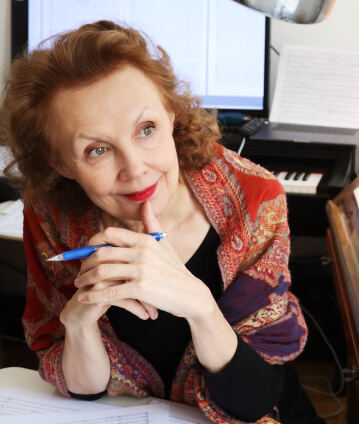卡雅·萨里亚赫
作曲
2000年,歌剧《来自远方的爱》由彼得·塞拉斯执导并在萨尔茨堡音乐节上首演,卡雅·萨里亚赫由此被更多人知晓。这位作曲家随后取得巨大成功,她不仅以其音乐广受关注,还因向赫尔辛基新音乐厅的管风琴建造项目捐赠一百万欧元而引起轰动。她曾接受柏林爱乐乐团的委约创作,包括2005年的充满太空氛围的管弦乐作品《小行星4179:图塔蒂斯》,以及《魔幻时刻》和《远眺》。
卡雅·萨里亚赫1952年出生于赫尔辛基。她的父亲劳努·拉阿科宁是防护掩体技术领域的重要制造商,因此她从小生活无忧。她在西贝柳斯音乐学院开始作曲学习,师从帕沃·海尼宁,随后赴达姆施塔特参加现代音乐暑期课程,并在弗赖堡师从布赖恩·费尔尼豪和克劳斯·胡伯继续深造。在此之前,她已在巴黎IRCAM(蓬皮杜艺术中心下属声学音乐研究中心)参加了计算机音乐课程,开始将电子与声学声音结合进行实验。计算机逐渐成为她作曲技术中的核心工具。 1982年,这位曾担任赫尔辛基当代音乐双年展艺术总监的作曲家移居巴黎,并在那里创作了逾百部题材和编制各异的作品。她的音乐以精致的音色处理和梦幻般的氛围著称。2008年,她被《美国音乐》杂志评为“年度作曲家”,评审团特别提到她在公众和媒体中的高度人气。她的舞台作品屡次引发关注,除了《遥远的爱》,还有《阿德里安娜·马特》、《西蒙娜的受难》、《埃米莉》、《唯有余音》和《无辜者》。2023年,卡雅·萨里亚赫因病逝世,享年70岁。